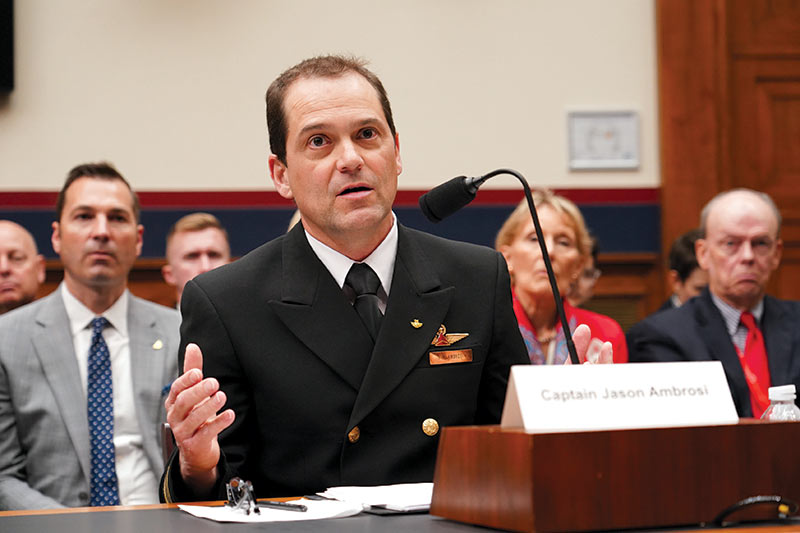ALPA Stresses Need to Maintain Aviation Safety Regulations
By John Perkinson, Senior Staff Writer

Capt. Jason Ambrosi, ALPA’s president, testifies at the congressional hearing “FAA Reauthorization: Examining the Current and Future Challenges Facing the Aerospace Workforce.”
Capt. Jason Ambrosi, ALPA’s president, testified before the U.S. House Aviation Subcommittee in Washington, D.C., on April 19, highlighting the airline industry’s remarkable safety record and the need to maintain current pilot standards. During a hearing titled “FAA Reauthorization: Examining the Current and Future Challenges Facing the Aerospace Workforce,” he asserted, “This is the wrong time to consider changing rules and rolling back safety regulations.”
Ambrosi referenced the Colgan Air Flight 3407 accident in Buffalo, N.Y., on Feb. 12, 2009, and the subsequent Airline Safety and Federal Aviation Administration Extension Act of 2010. This landmark legislation raised the bar for first officer qualification and pilot training requirements.
Prior to the legislation, first officers were only required to have a commercial license obtained with approximately 250 hours of flight time. During the two decades before the 2010 rule change, more than 1,100 lives were lost in U.S. airline accidents.
“Since then, passenger fatalities have dropped 99.8 percent,” Ambrosi observed, adding, “This year’s reauthorization should be based on retaining these provisions.”
In submitted separate written testimony, Ambrosi pointed out that “responding to temporary post-COVID industry problems with permanent changes to pilot training and qualification requirements is ill-considered and dangerous…. Attempts to undermine or otherwise alter or repeal this lifesaving set of requirements, including moving from an experiential-based training and qualification regime to a simulation-based system, threatens the lives of the traveling public and frontline aviation workers and should be summarily rejected.”
ALPA’s president acknowledged the vision demonstrated and tremendous support extended by Congress to the airline industry during the pandemic. “I’d like to thank this committee for its bold action in 2020 to pass the payroll support program [as part of the Coronavirus Aid, Relief, and Economic Security Act],” he said. “Your work guaranteed that this country would have enough pilots during the pandemic and could respond to demand-driven growth when recovery came. Thanks to you, the United States has more than enough pilots and the safest skies in the world.”
According to a recent FAA report, the United States has certificated nearly 64,000 airline transport pilots since July 2013, while airlines have hired to fill approximately 40,000 positions. “Fortunately, we have more pilots available now than before the pandemic,” Ambrosi commented. “Moreover, pilot training classes are at capacity, and college aviation programs are full.”
He observed, “Large passenger and cargo airlines have 7,500 more pilots today than before the pandemic. While encouraging, we shouldn’t lose focus on continuing to expand the pilot pipeline.”
Ambrosi noted the importance of building on the strength of America’s aviation workforce, outlining the need to
- provide student loans for appropriate flight training programs,
- establish grants to build flight training and education degree programs at minority-serving institutions,
- increase funding for the Workforce Development Grant Program, and
- make the FAA’s Women in Aviation Advisory Board a permanent body.
He also discussed needed improvements for the Essential Air Service program, remarking, “I flew for a regional airline and am committed to ensuring that small and rural community passengers have access to safe and reliable air service. However, under deregulation, airlines base service decisions on market demand.”
During the ensuing Q&A session, ALPA’s president responded to 16 different representatives on topics like the Association’s educational outreach and diversity efforts, possible training changes, airline pilot experience requirements, and the mandatory pilot retirement age.
Following the hearing, Ambrosi left the Rayburn House Office Building to join a press conference on the west side of the Capitol building. Other participants included Rep. Brian Higgins (D-NY), Rep. Nick Langworthy (R-NY), and family members of the victims of the Colgan Air accident. Together, the group stressed the need for Congress to protect flight safety standards, giving particular attention to the need to uphold the so-called 1,500-hour rule addressing flight-time experience.
As part of his remarks, Ambrosi referenced his early days in aviation, flying as a regional airline captain. Before Congress strengthened first officer requirements, Ambrosi noted, “Many of the new pilots who came to work on my flight deck needed on-the-job training. It was a bad idea then and an even worse idea now.”
The FAA’s current funding and authorities are set to expire on Sept. 30, 2023.

